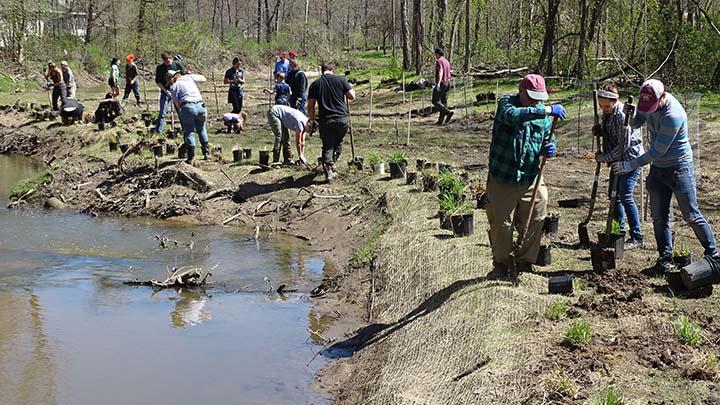Major Watershed Restoration Grant Awarded to Plaster Creek Stewards

Since 2009, Plaster Creek Stewards has been working alongside residents, churches, and schools to restore the health and beauty to one of west Michigan's most contaminated watersheds.
Calvin University’s Plaster Creek Stewards (PCS) has been awarded a major two-year grant from the State of Michigan Department of Environment, Great Lakes, and Energy (EGLE). The grant, with a total value of $1,018,251 will allow PCS to implement a major floodplain restoration project, expand its urban curb-cut rain garden project, and support multiple students to assist in the installation, management, and research of these efforts.
Seeing Tangible Results
“Over the past 13 years, we've gotten to see Grand Rapids grow as a green stormwater project hot spot,” said Andrea Lubberts, PCS program manager. “The fact we got this grant is a big deal. We are the most competitive city in Michigan when it comes to getting stormwater funding. We have great partners, we work together, we make each other better.”
Since its founding in 2009, PCS has received more than 20 major grants totaling over $5 million in funding.
These grants have had tangible results: the transformation of more than 50 acres of watershed land into natural habitat, the installation of 120 curb-cut rain gardens, and the restoration of floodplains to mitigate flooding and erosion downstream.
While these results are significant and the reason PCS was created to begin with, the work runs much deeper.
Changing Behaviors
“We initially saw our work as focused on cleaning up the creek,” said Dave Warners, a professor of biology and director of PCS. “What we’ve come to realize is that what we need is changed behaviors by residents and churches and schools.”
And PCS leaders say changing those behaviors comes through building relationships with residents, with churches, with schools, and with the creek.
“If we clean up the creek and no behaviors change, the creek will become decimated again,” said Warners. “We have to develop relationship and build trust, and that takes time and education.”
PCS has done that through their three-fold mission of restoring the health and beauty of Plaster Creek through education, research, and on-the-ground restoration.
PCS has given 500 educational presentations and worked with many local schools who are now incorporating local watershed projects into their curriculum, and have involved more than 40 faith communities and thousands of volunteers in this hopeful work of watershed restoration.
Building Trusted Partnerships
The work that’s been done on the watershed, while significant, really pales in comparison to the trust that’s been built and the relationships that have been cultivated in the community.
“So, we want to restore the floodplain in that area, but we want the added benefit of having the community help us restore the floodplain,” said Warners. “We are helping to cultivate a relationship between people and the creek and between upstream and downstream residents themselves. We want to help them see they are all part of the same watershed.”
Because it’s about connection, and if upstream and downstream neighbors aren’t talking to one another, then neither understands how their action or inaction affects the other.
“As soon as you start conceptualizing this upstream downstream situation, what people do in their place influences people elsewhere, it can be applied in so many different areas,” said Warners. “They see they are not nearly as isolated as they thought they were. We all depend on one another and my actions are going to impact other people. So upstream/downstream thinking opens up all kinds of new awarenesses I think, it helps us live more thoughtfully and intentionally. We all are one human race, we need each other and our actions influence one another.”
Gaining New Perspectives
What’s even more impressive about this work is the learning that happens along the way, that is carried down river and into new communities.
“The research we do here feeds back into education and in helping build awareness,” said Lubberts. “We also share what we are learning here with other watershed groups.”
“The number of students we’ve had interactions with through Plaster Creek Stewards has been so wonderful. Many of them are not biology or chemistry majors, but are young people who are passionate about the environment. We hear testimonials later on about how PCS helped them formulate their expectations for how they wanted to live in the world,” said Lubberts. “You know it’s made a difference and they are going to make a difference somewhere else.”
“The young people we work with are learning to see a place with fresh eyes,” said Warners. “They become aware of things that they wouldn’t have known if they had not been part of Plaster Creek Stewards. It’s a very effective way to literally do education.”






